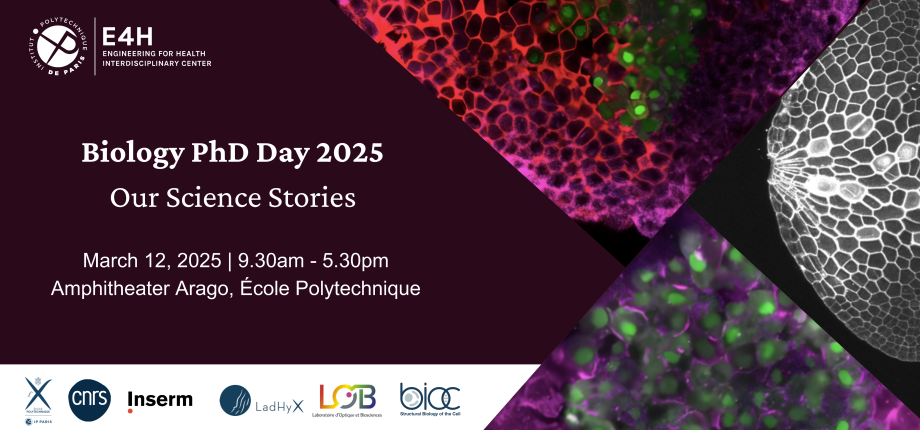Biology PhD Day

What are biology PhD students up to in their labs all day? Are they tackling tricky experiments, testing new hypotheses, or brainstorming the next big breakthrough? Most likely, it’s a bit of everything, depending on the day and where their curiosity leads them.
We invite you to join us on March 12 in Amphitheater Arago at École Polytechnique for a series of inspiring presentations and eye-catching posters showcasing the research carried out by IP Paris’ Biology PhD students.
Come hear their science stories and see how they are pushing the boundaries of scientific knowledge!
This event offers a unique opportunity to explore the diverse research themes of the IP Paris biology labs, including LOB, BIOC, and LadHyX. It will also provide a platform for exchanging knowledge, fostering collaboration, and inspiring new research ideas across many dynamic fields, from optics to biochemistry, molecular biology, structural biology, cell biology, biomechanics, bioinformatics, and more.
We are also honored to welcome our keynote speaker, Dr. Marielle VALERIO-LEPINIEC, whose research focuses on pioneering new methods for engineering proteins and binding sites using combinatorial biology and directed evolution. Her team has developed αReps, a family of artificial repeat proteins with remarkable binding capabilities. These versatile proteins are applied across a wide range of fields. In structural and cellular biology, they have operated as crystallization helpers and intracellular tracers in living cells or antiviral Nanoligands. In chemistry and physics, αReps have enabled the development of generic biosensors, nanobiomaterials, supramolecular assemblies, and artificial metalloenzymes with stereoselective or inducible activity.
Program:
> Download the Program and Book of abstracts
| 8h30 | Registration and Welcome Reception |
| 9h15 | Opening Remarks |
| Session 1. Molecular Regulation : A focus on RNA | |
| 9h25 | Characterization of two RNA modification enzymes involved in intellectual disorders Laurianne Li En TAY, Laboratory of Structural Biology of the Cell (BIOC) , Laboratory of Molecular Chemistry (LCM) |
| 9h40 | Exploring RNA circularization by Pab1020 in Pyrococcus abyssi Maria IMEZAR, Laboratory for Optics and Biosciences (LOB) |
| Session 2. Molecular Regulation : A focus on Proteins | |
| 10h00 | Human PYURF, a mitochondrial TRMT112-like protein Wanwan HU, Laboratory of Structural Biology of the Cell (BIOC) |
| 10h15 | Unraveling the function of a new protein modification enzyme Bhumika GARKHAL, Laboratory of Structural Biology of the Cell (BIOC) |
| 10h30 | Coffee Break |
| Session 3. Invited Speaker | |
| 10h55 | AlphaReps artificial repeat proteins as modular bioengineering tools Marielle VALERIO-LEPINIEC Institute for Integrative Biology of the Cell (I2BC), Université Paris-Saclay |
| Session 4. A look to the future | |
| 11h40 | Everything you need to know about Postdocs Morgane CORRE and Jordan FERRIA Laboratory of Structural Biology of the Cell (BIOC) , Laboratory of Hydrodynamics (LadHyx) |
| 12h10 | Lunch, Poster Session |
| Session 5. Optics for molecular processes | |
| 14h30 | Mapping DNA replication in a polyploid archaea by superresolution microscopy Dorian NOURY Laboratory for Optics and Biosciences (LOB) |
| 14h45 | Elucidating the intracellular organisation of archaeal translation machinery by microscopy Tom GARNIER Laboratory of Structural Biology of the Cell (BIOC) , Laboratory for Optics and Biosciences (LOB) |
| 15h00 | Ultrasensitive in vitro diagnostics using luminescent lanthanide-based nanoparticles Robin KUHNER Laboratory for Optics and Biosciences (LOB) |
| 15h15 | Coffee Break, Poster Session |
| Session 6. Cells and migration | |
| 15h50 | Role of the NHS protein in cell migration Ekaterina TSYDENZHAPOVA Laboratory of Structural Biology of the Cell (BIOC) |
| 16h05 | Impact of cold atmospheric plasma on cell migration Benjamin LABERIE Laboratory of Structural Biology of the Cell (BIOC), Laboratory of Plasma Physics (LPP) |
| Session 7. Chip and Tissue | |
| 16h25 | Mechanical regulation of growth by FERONIA in Marchantia gemmae Elise MULLER Laboratory of Hydrodynamics (LadHyx) |
| 16h40 | Monitoring renal pathophysiological processes using quantitative imaging in Glomerulus-on-a-chip models Aichata SIDI ABDEL JELIL Laboratory for Optics and Biosciences (LOB) |
| 17h | Concluding Remarks and awards |
Contact:
Maria Imezar, Laboratory for Optics and Biosciences (LOB), École polytechnique













